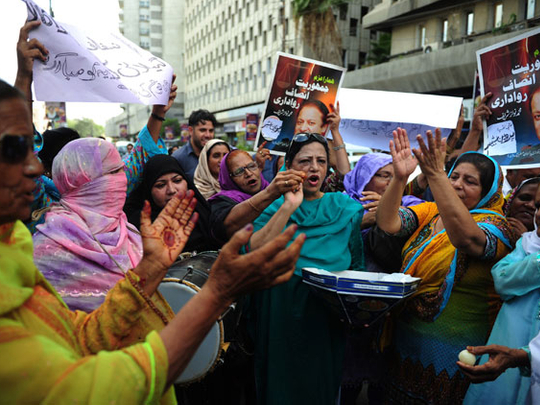
Islamabad: Pakistan President Asif Ali Zardari has summoned parliament to convene on Friday to elect a new prime minister, with outgoing textile minister Makhdoom Shahabuddin emerging as the likely candidate for the job.
Prime Minister Yousuf Raza Gilani was dismissed Tuesday along with his cabinet by the Supreme Court for failing to investigate his Zardari for corruption, adding to political instability in a country already saddled with massive economic and security problems.
But in moving quickly to install a new premier — and not defying the court order as some had predicted — the government may reduce fears of major upheaval, at least in the short term.
In a statement Wednesday, the presidency said the national assembly would be convened on Friday afternoon.
A government official confirmed that the purpose of the meeting was to elect a new premier.
Zardari's Pakistan People's Party has the largest number of seats in parliament and is currently in government with coalition partners, which must also support his choice for prime minister to ensure he gets elected. Zardari has been meeting those partners to discuss a candidate.
The official said that Shahabuddin was the likely candidate, as did another member of the ruling PPP. They didn't give their names because they weren’t authorised to speak on the record about internal party decisions.
Shahabuddin is from Rahim Yar Khan, a conservative Islamic city in south of Punjab province. He is considered a party loyalist and was known to be close to Zardari's late wife, Benazir Bhutto, who headed the party before she was killed in 2007 by Islamist militants.
Whoever takes over will not have long in power and is likely to face a rocky ride.
The government must call elections before March next year.
Under the constitution, polls can only be held under a caretaker government, which must be in place three months before election day.
Many analysts have speculated that the current political upheaval may expedite the polls, possibly to November.
Elections before that date are considered unlikely because of the fierce summer heat.
The new prime minister will also likely run into trouble with the Supreme Court, which is expected to make the same demand of him or her as it did of Gilani, namely to initiate a corruption probe against Zardari. The court has been criticised by some for taking political decisions and jeopardising the democratic setup in Pakistan.
Act quickly
Meanwhile, The News urged Zardari to act quickly to find a cabinet capable of dealing with the huge problems facing ordinary Pakistanis — crushing power cuts, rioting, violence, inflation and insecurity.
“Contrary to the claims by many, the ouster of the prime minister and his cabinet has not shaken the democratic system. Parliament is intact and a new leader of the house may soon be in place,” said the English-language daily.
Gilani’s disqualification was the culmination of a showdown between the judiciary led by a popular chief justice, and a weak, ineffective government that critics say has been politicised at best, or vendetta-driven at worst.
Zardari prevaricated for months on restoring the independent judiciary after the PPP won general elections in February 2008, only doing so in March 2009 to stave off a threatened opposition march on Islamabad.
In December 2009, the Supreme Court annulled a controversial amnesty that had allowed Zardari and his late wife, former prime minister Benazir Bhutto, back into politics in exchange for a moratorium on corruption cases.
But the government refused to request the Swiss reopen investigations. The court’s patience ran out and on April 26 it convicted Gilani of contempt.
Gilani always insisted Zardari had immunity as head of state and that writing to the Swiss would be a violation of Pakistan’s constitution.
PPP supporters accuse the court, in collusion with the army and the opposition, of trying to bring down Zardari before February 2013, when the administration would become the first in Pakistan to complete a full five-year term.
The cases against Zardari date to the 1990s, when he and his late wife are suspected of using Swiss banks to launder $12 million allegedly paid in bribes by companies seeking customs contracts.
The Swiss shelved the cases in 2008 when Zardari became president.












